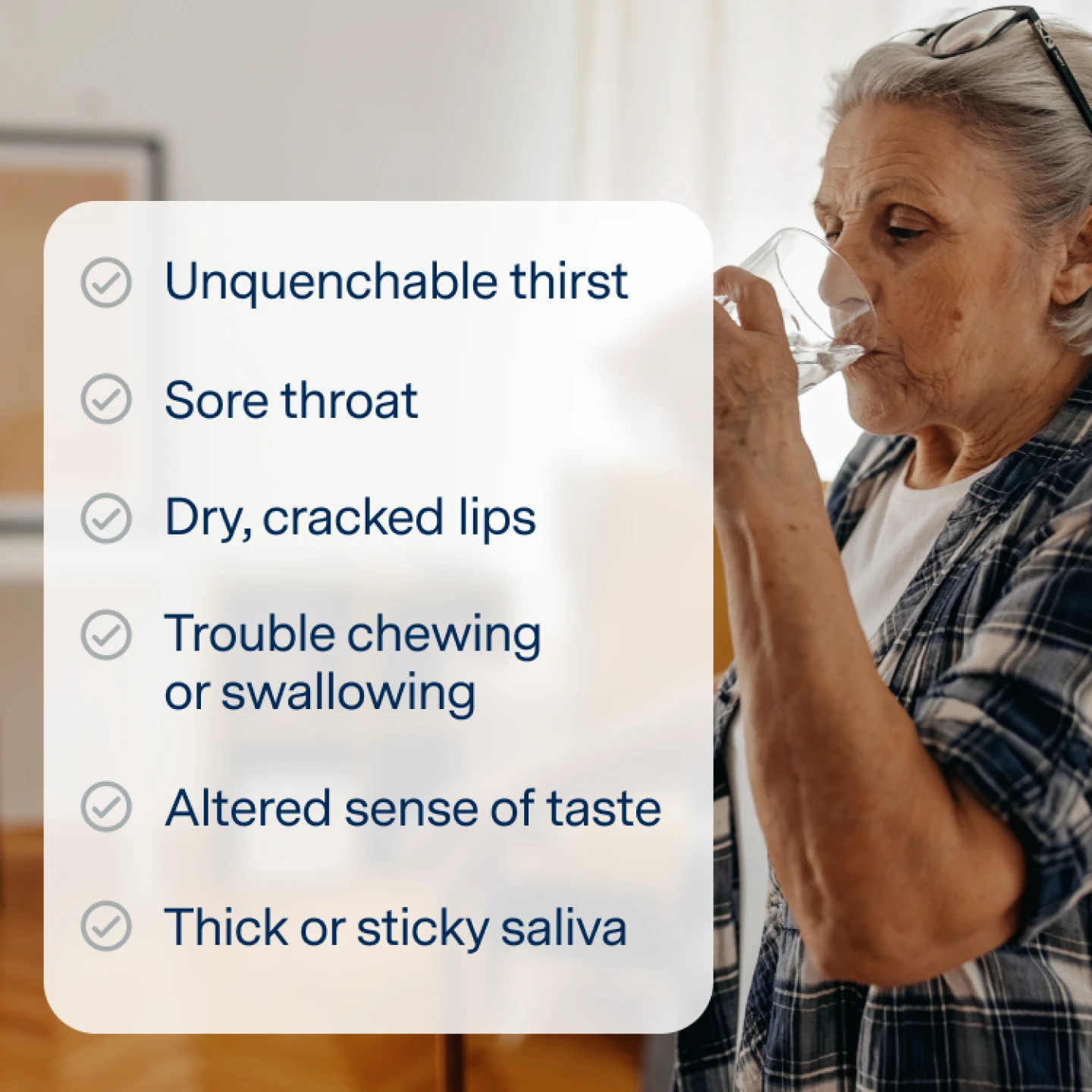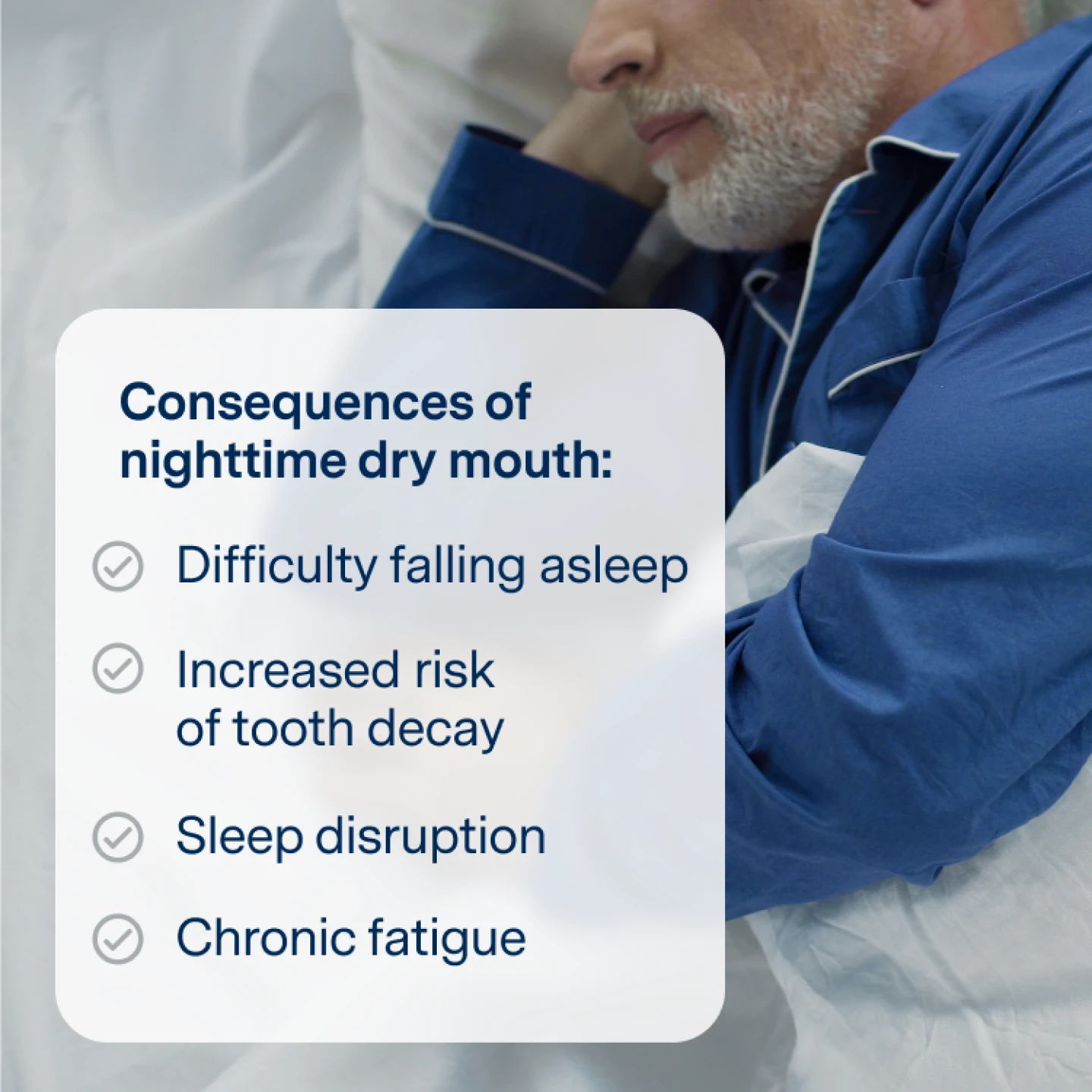Dry mouth
Dry mouth (xerostomia) occurs when you experience a decrease in saliva—but its cause is often not that simple. A number of factors can bring on dry mouth and ultimately impact your dental health. If you notice the onset of an unusually dry mouth, talk to your Aspen Dental care team today.
Dry mouth: what’s the big deal?
When the salivary glands in your mouth don’t produce enough saliva to keep it moist, you’re experiencing dry mouth. Saliva is key for digesting foods properly and neutralizing acids caused by plaque—the sticky substance made from food particles and bacteria that cause cavities. Chronic dry mouth can lead to a number of dental issues, which we’ll discuss

Dry mouth symptoms
First things first—let’s talk about the symptoms you may be experiencing when it comes to dry mouth. If you notice any of these for an extended period of time, discuss your treatment options with your Aspen Dental care team.
Dry mouth causes
Many factors can cause dry mouth, including certain medical conditions or lifestyle choices. Let’s ask what else may be impacting your onset of dry mouth.Are you dehydrated?
Dehydration can be caused by a number of symptoms, including vomiting, diarrhea, blood loss, excess sweating or simply from not drinking enough water. If you currently have any signs of dehydration, you will likely experience dry mouth.
Are you coping with an illness?
Dry mouth can be a side effect of various medical conditions, including Alzheimer’s, anemia, Sjögren’s syndrome, diabetes, HIV/AIDS, high blood pressure (hypertension), Parkinson’s, rheumatoid arthritis or the result of a recent stroke. Cancer treatment, including chemotherapy and radiation to the head or neck region, also leads to dry mouth.
Are you taking medications?
Many prescriptions and over-the-counter drugs can cause dry mouth as a side effect. This is common in medicines that treat colds, anxiety, depression, allergies, epilepsy, asthma and more. Read your medication label(s) to see if dry mouth is listed as a possible side effect. Taking multiple medications on a daily basis can also contribute to chronic dry mouth.
Are you a current smoker?
Smoking or chewing tobacco affects how much saliva you produce, and breathing primarily through your mouth can result in persistent dry mouth.
Effects of dry mouth on your dental health
Leaving dry mouth untreated can have a big impact on your dental health—which is why it’s important to see your Aspen Dental care team if you are experiencing prolonged symptoms. If left unchecked, dry mouth can lead to:
Tooth Decay: Saliva helps to neutralize acids and keep the surface of your teeth strong by providing high levels of calcium, fluoride and phosphate ions. Without enough saliva protecting your teeth, they are more prone to decay.
Gum Disease: Dry mouth can create an environment where harmful bacteria can thrive, increasing your chances of gum disease.
Bad Breath: Insufficient saliva allows bacteria to build up, leading to bad breath (halitosis).
Mouth Sores and Infections: Dry mouth can cause mouth irritation, making you more prone to developing mouth sores and infections.
Dry mouth at night
Your body naturally produces less saliva while you sleep versus when you are awake. You may even wake up in the morning with a sore or scratchy throat (not to mention feeling fatigued). Sound familiar? Let’s explore what may be causing your nighttime dry mouth.

Causes of dry mouth at night
Mouth breathing: Breathing through your mouth while sleeping can dry up your saliva, leading to chronic dry mouth symptoms.
Sleeping on your back: Sleeping on your back can encourage mouth breathing and ultimately dry out your saliva.
Dehydration: If you’re not drinking enough water during the day, your body may wake you up in the middle of the night to remind you to take a drink (or three).
Medications: Some medications can reduce saliva production, particularly at night.
Snoring: Snoring and sleep apnea can cause mouth breathing and dry mouth. Additionally, a common side effect of CPAP machines that treat snoring and sleep apnea is dry mouth due to the appliance keeping your mouth open.
Dry mouth treatment tips
Treating dry mouth can be challenging, but there are several ways you can find relief and improve your overall oral health. Whether your dry mouth results from medications, medical conditions, or lifestyle, finding the right treatment approach can make a big difference in your overall well-being.
Stay hydrated
Increasing your water intake throughout the day will help you stay ahead of dry mouth. Carry a water bottle with you to sip on regularly and consider setting reminders on your phone. Pro tip: add moisture to your bedroom air with a humidifier to help prevent dry mouth while you sleep.
Use a saliva substitute
Over-the-counter saliva substitutes or artificial saliva products mimic your natural saliva to moisten the mouth and counteract dry mouth symptoms. These products come in various forms, including sprays, gels, mouthwash and rinses. Find one that works for you.
Discuss prescription medications
In cases of severe dry mouth, your healthcare provider may prescribe medications to help boost saliva production. These medications can be beneficial if dry mouth is a side effect of other medicines you’re taking. Additionally, dry mouth can be a side effect of certain medications as well— your doctor may consider exploring alternative options to minimize this effect or even adjust your dosage.
Explore biotene products
Biotene offers a range of specially formulated products designed to combat dry mouth, including biotene dry mouth oral rinse, mouthwash for dry mouth, specially formulated toothpaste, oral gels, and dry mouth lozenges. Biotene products can provide improved oral comfort and serve as a reliable dry-mouth remedy.
Practice proper oral hygiene
Having a regular oral hygiene routine is crucial. Brush your teeth with fluoride-infused toothpaste and a soft-bristle toothbrush at least twice daily. Consider using a fluoride rinse as well and remember to floss daily.
Make healthy choices
Certain lifestyle changes can help alleviate dry mouth. Reducing or eliminating tobacco, alcohol consumption, and caffeine intake can help with persistent dry mouth
Dry mouth FAQs
What causes dry mouth?
Dry mouth (xerostomia) can be caused by various factors such as medications, medical conditions like Sjögren's syndrome or diabetes, dehydration, nerve damage, and lifestyle habits like mouth breathing and tobacco use. Finding what causes dry mouth includes identifying the underlying cause for treatment and then determining the best management option. Dry mouth symptoms have also been observed as a symptom of COVID-19.
How do I get rid of dry mouth?
Easing your dry mouth symptoms includes hydration, using sugar-free gum or candies to stimulate saliva, and over-the-counter saliva substitutes for continued relief. Consulting a healthcare professional for tailored advice and addressing underlying causes like medications or medical conditions can help manage dry mouth.
What causes extremely dry mouth while sleeping?
Nighttime dry mouth can be caused by breathing, sleep position, dehydration, or certain medications. Identifying the specific cause is vital for finding targeted solutions for a more comfortable night’s sleep.
How can I avoid dry mouth during pregnancy?
You can prevent dry mouth during pregnancy by following the same simple steps—staying hydrated by drinking ample water, chewing sugar-free gum for saliva stimulation, and maintaining a thorough oral hygiene routine. Ask your doctor for more specific treatments tailored to your health needs.
Should I discuss dry mouth with my dentist?
Because salvia plays such a major part in keeping our mouths healthy, it’s important to call your local office right away if you’re experience prolonged symptoms. Schedule an appointment today and discuss your treatment options.
Discover more for your smile
Preventing dry mouth starts here
Remember, you can treat and even prevent dry mouth by visiting your local Aspen Dental regularly for checkups and professional cleanings. Make an appointment today.
